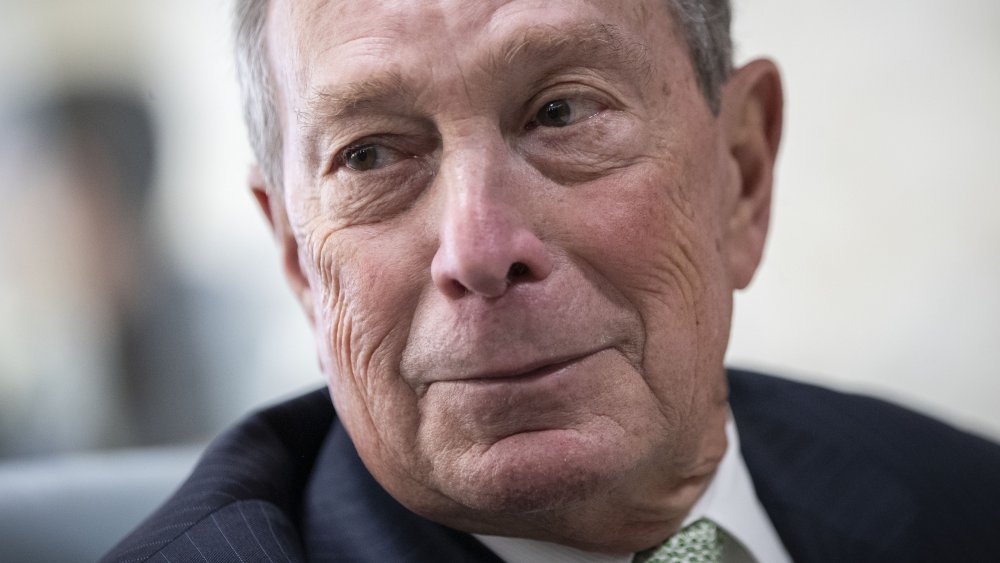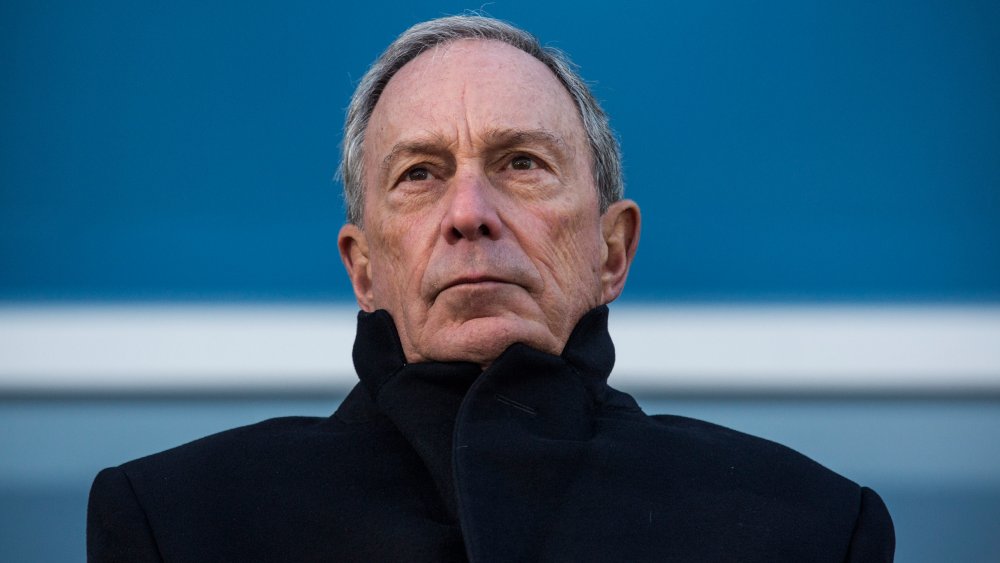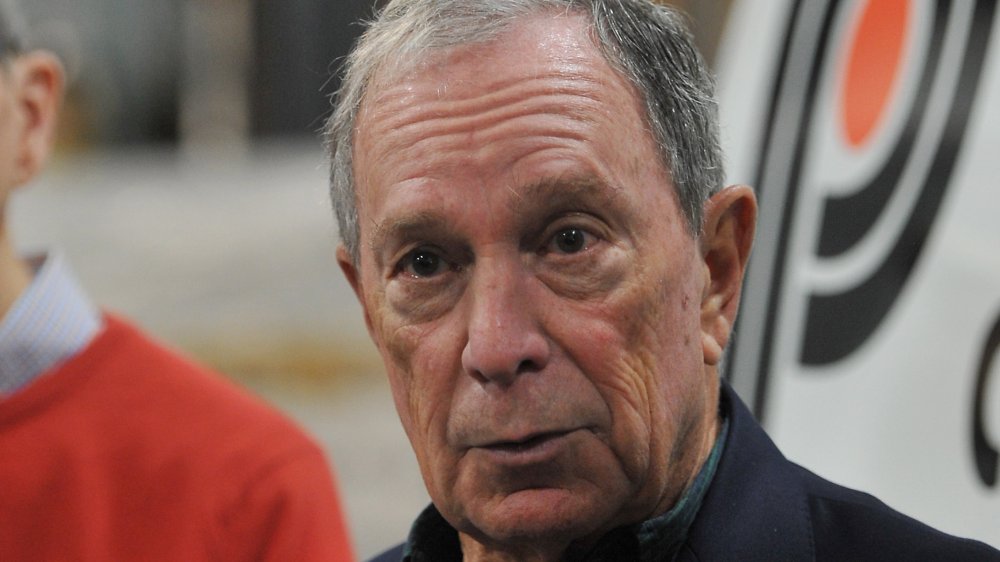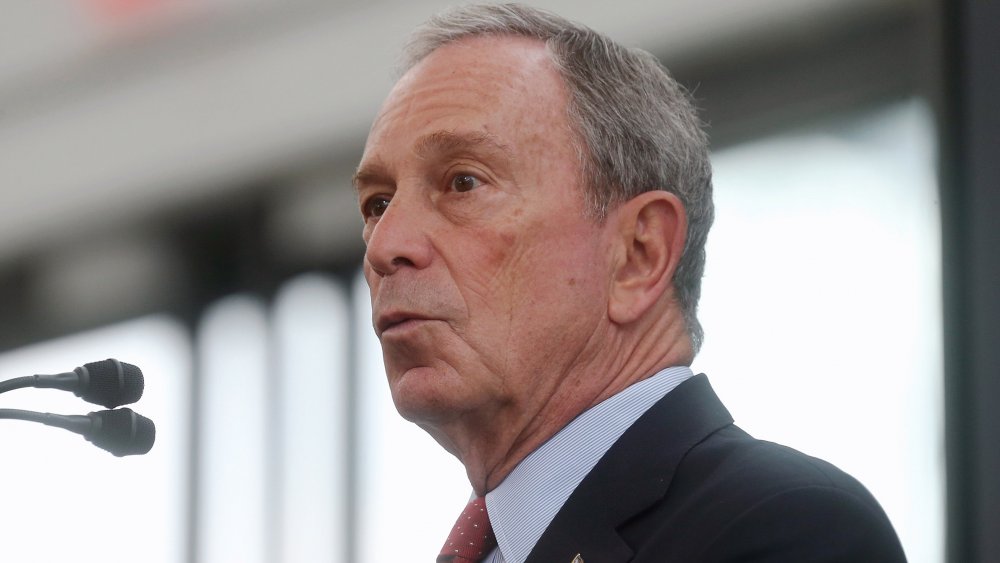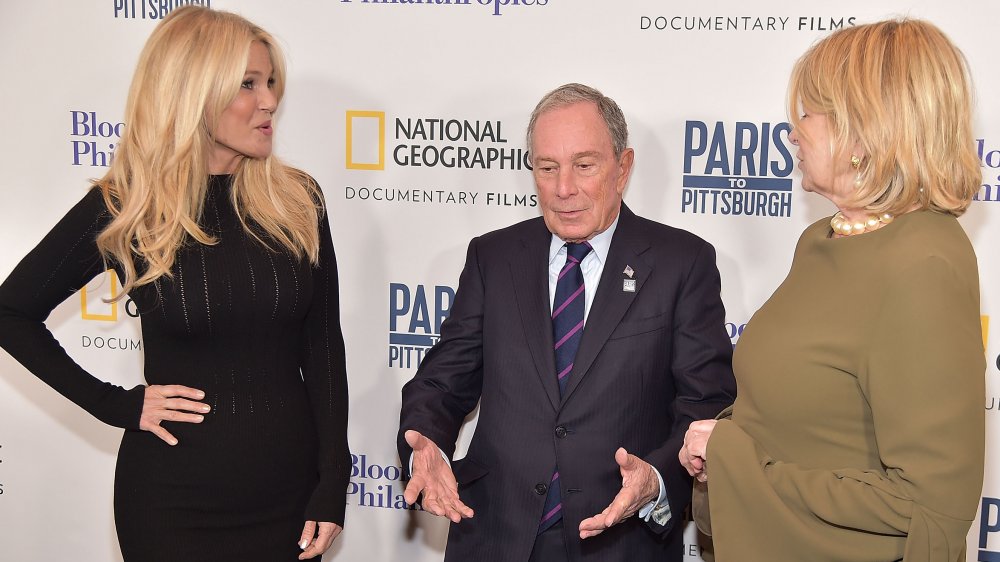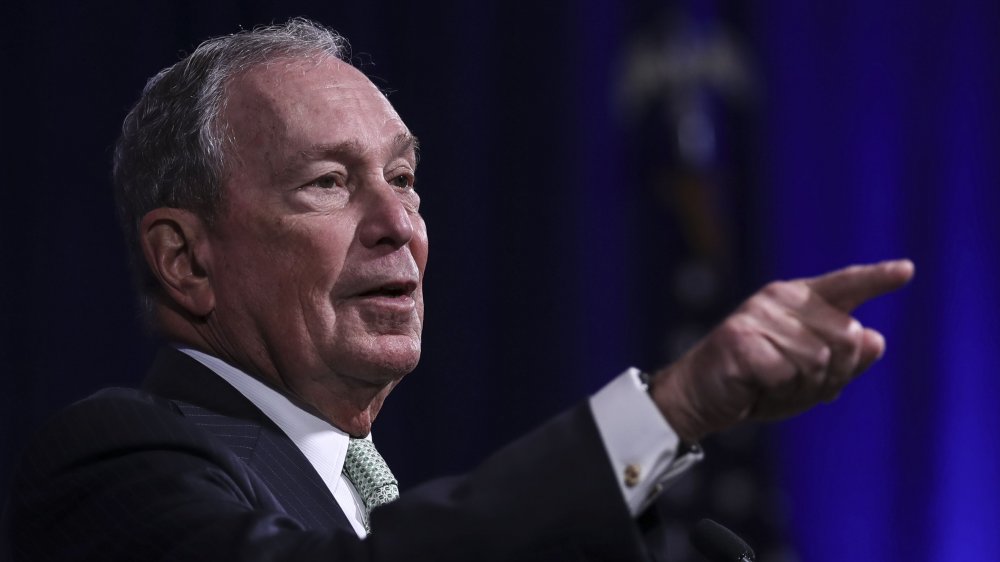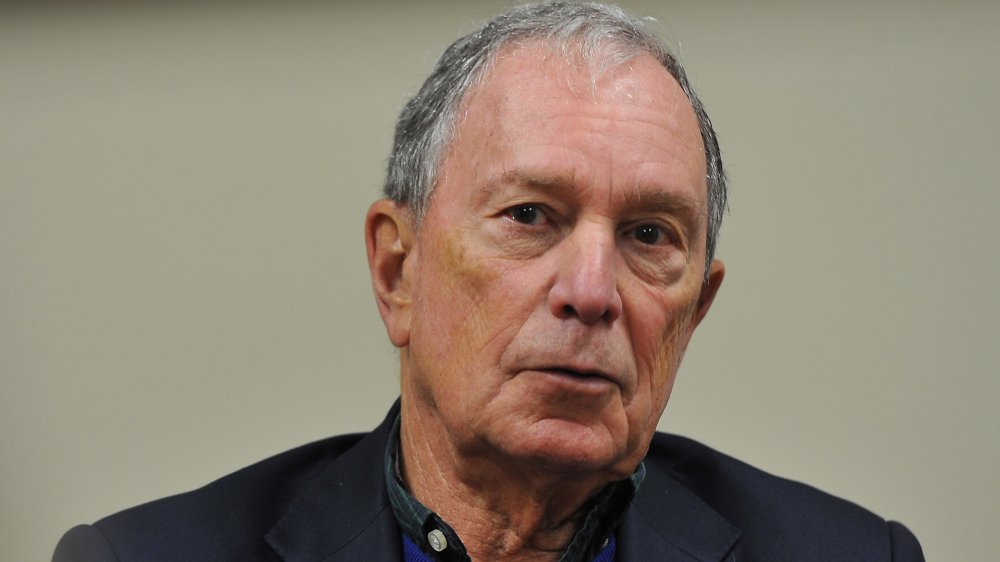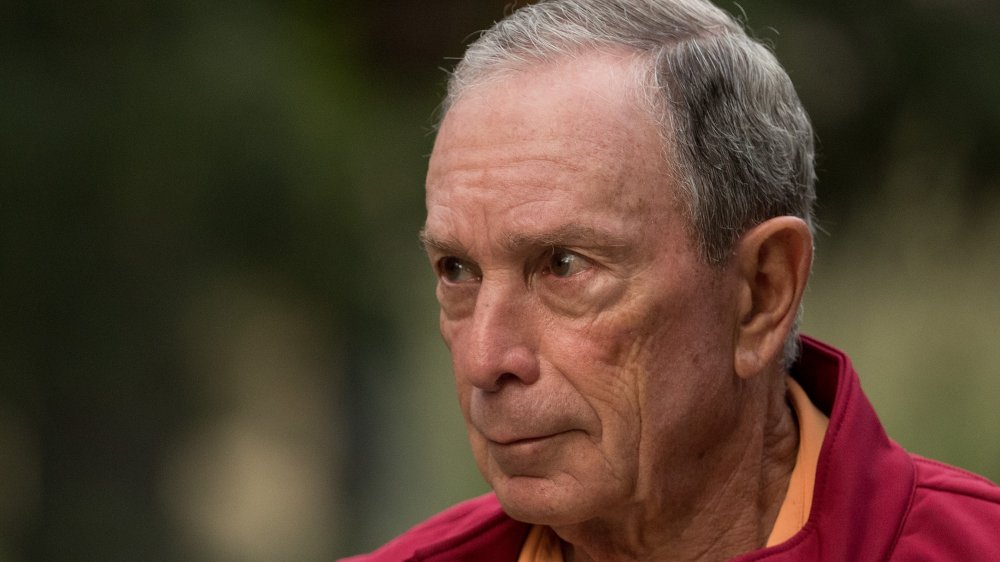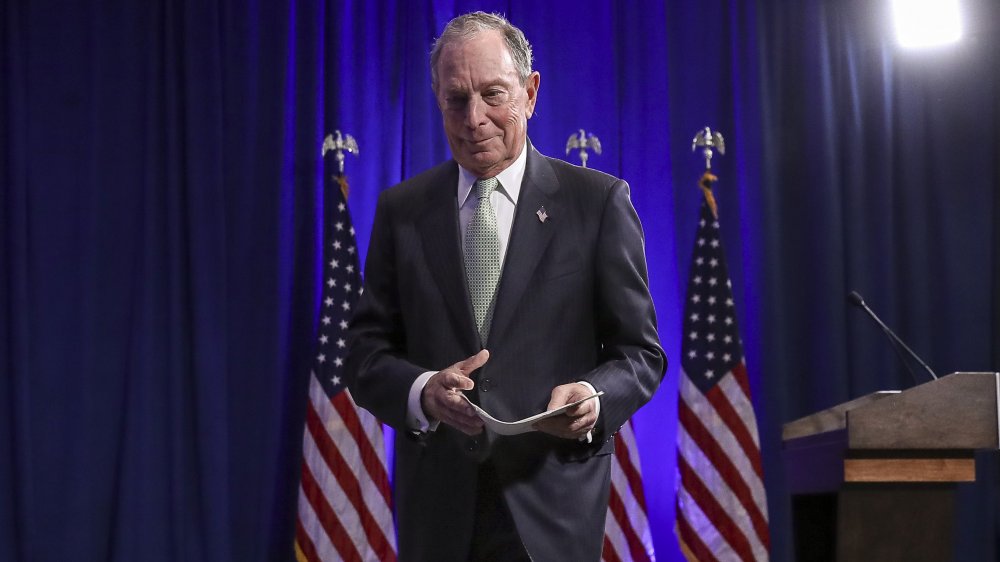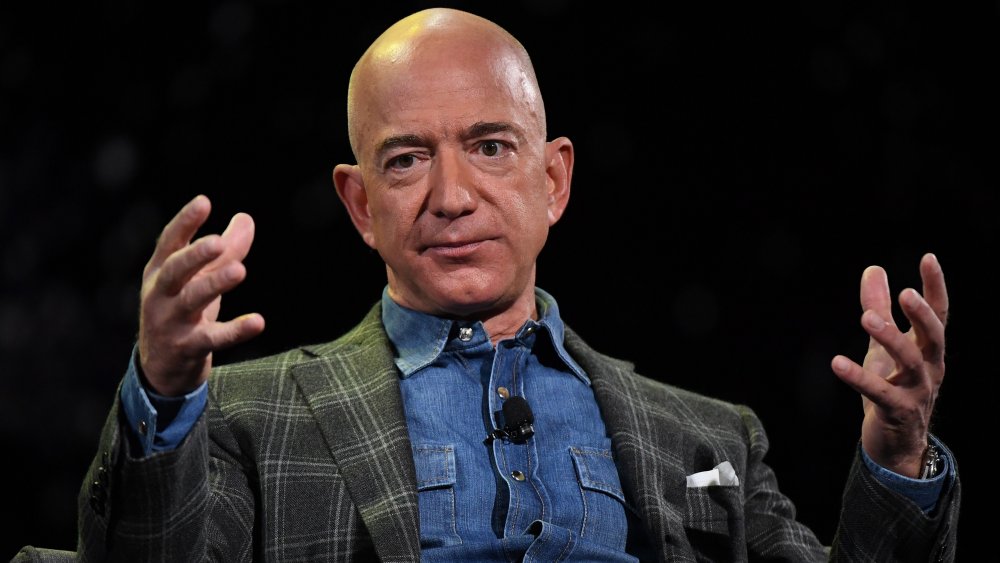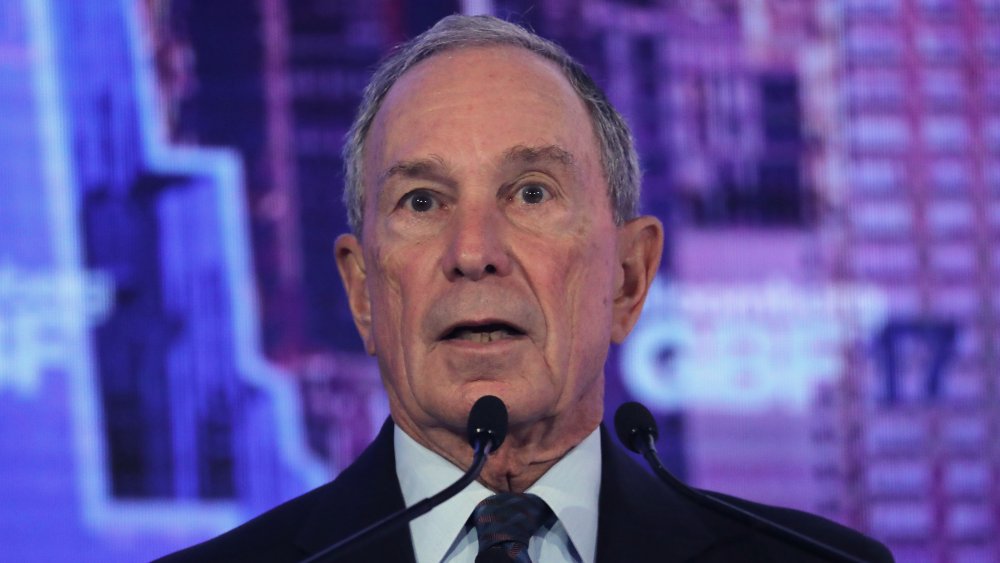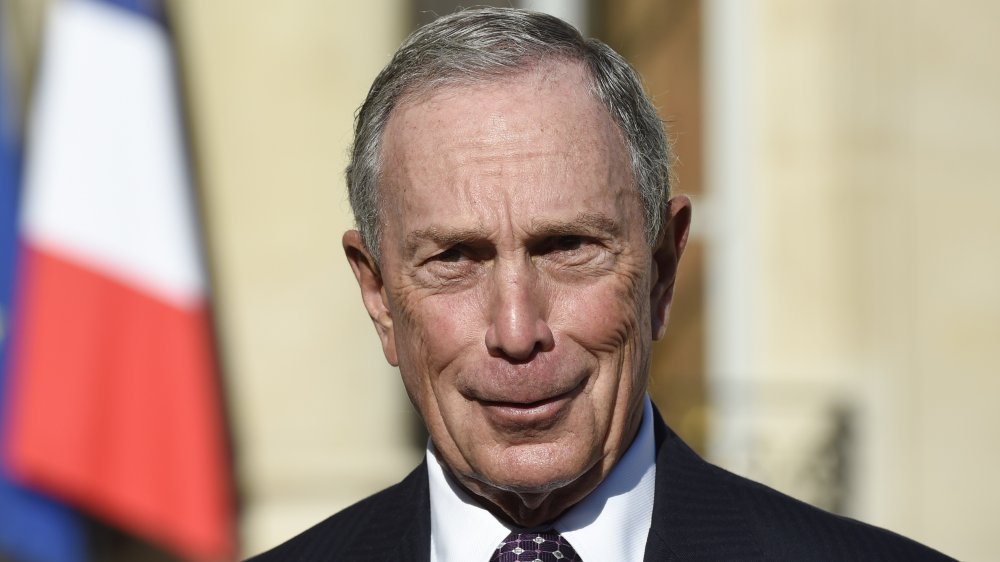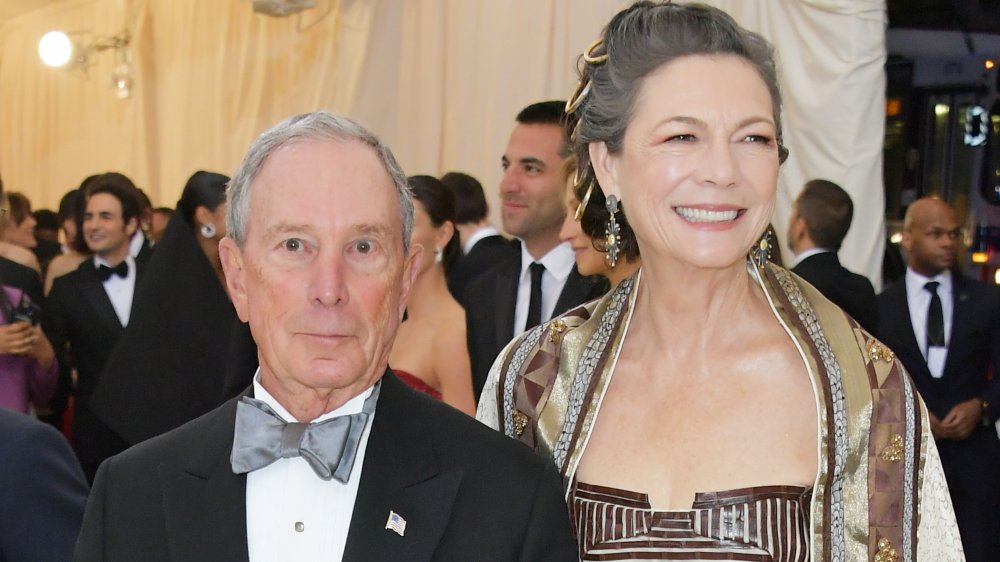The Untold Truth Of Michael Bloomberg
Every day, Bloomberg News updates its Bloomberg Billionaires Index, which purportedly ranks "each of the world's 500 richest people." Yet every day, eponymous billionaire Michael Bloomberg is conspicuously missing from the list. As of this writing, he boasts a net worth of $55.5 billion, according to Forbes. He just doesn't boast it on Bloomberg News because it doesn't cover its parent company, Bloomberg LP, or the father of that company, Michael Bloomberg. If included on his index, he would currently rank as the 16th wealthiest person on Earth.
As Biography details, Bloomberg amassed his humongous fortune with the game-changing computer terminals he started selling to investment banks in the early 1980s. As business boomed, the company "branched into" the news industry. Bloomberg would make his own headlines as mayor of New York, even spearheading legislation that allowed him to serve a third term.
Well-known for donating to philanthropic causes, Bloomberg used the power of his purse to make waves in the 2020 presidential race without qualifying for debates or participating in early primaries. Per The Globe Post, he kicked off his campaign with the "single biggest one-week ad buy for a presidential campaign in U.S. history," spending $34 million. Time will tell if Bloomberg comes out smelling like a rose, but his past was definitely thorny at points. Regardless of whether he passes your smell test, the man has had a controversial life, and today, we're taking a look at the untold truth of Michael Bloomberg.
Michael Bloomberg worked in a vault (in his underwear)
Michael Bloomberg entered the business world in an unglamorous fashion. In a sense, there was almost no fashion because he worked in his underwear (or as he hopefully called it, his Fruit of the Bloom) with other scantily clad guys. While that might read like the description of a film called Magic Mike Bloomberg, this story is more about making money than shaking a moneymaker. As recounted by author Eleanor Randolph, after graduating from Harvard Business School in 1966, Bloomberg applied to work at Goldman Sachs and the family-run bond trading firm, Salomon Brothers & Hutzler, where he forged a firm bond with managing partner William Salomon.
New hirees were tasked with counting billions of dollars of bonds and stock certificates in a stuffy vault, and Bloomberg was no exception. He said of the experience, "We slaved in our underwear, in an un-air-conditioned bank vault, with an occasional six-pack of beer to make it more bearable." This was a different time, when casual Fridays were presumably way too casual. On top of that, back then (per the New York Daily News), people copied documents using carbon paper, and when papers had to be delivered between floors in short order, they were placed in a basket and lowered on a rope through a window. As technology evolved and Bloomberg rose through the corporate ranks, he increasingly advocated using computers.
His dodgy Vietnam story
In 2019, New York Times columnist Maureen Dowd penned an op-ed titled "Nanny Bloomberg steps up as the opposite of Baby Trump." Dowd found various parallels between the rivals. Notably, she wrote, "Both have their feet to thank for keeping them out of Vietnam; Bloomberg had flat feet and Trump (supposedly) had bone spurs." That parenthetical "supposedly" presumably alludes to allegations that Trump faked a foot ailment to dodge the Vietnam draft. However, Dowd didn't mention that Bloomberg made demonstrably inaccurate claims about his exemption.
In 2001, then-mayoral candidate Michael Bloomberg faced unwanted scrutiny over claims he made in his memoirs. As detailed in an investigation by the New York Daily News, he claimed in his book and campaign brochures that while attending Harvard Business School, he "volunteered" to serve in Vietnam. Bloomberg further asserted that he secured "a commitment from an Army unit that would make [him] a second lieutenant" but got rejected because of his flat feet.
Selective Service records discredit that account, indicating Bloomberg never volunteered to serve. The Army unit he was poised to join didn't exist, which Bloomberg's campaign admitted. Moreover, military experts and Selective Service officials rejected the claim that flat feet would flat-out disqualify someone from enlisting. However, that hasn't stopped Bloomberg from repeating the claim, as author Joyce Purnick recalled confronting Bloomberg about the discrepancies and said the vexed politician "suddenly tore off his loafers" to show he had flat feet.
He defended 'stop-and-frisk' months before apologizing for it
In 2019, Michael Bloomberg initially ruled out a presidential run, partly because he didn't want to go on an "apology tour" for his controversial political past. In March, he joked that presidential hopeful "Joe Biden went out and apologized for being male, over 50, white." Bloomberg also criticized liberals for denouncing the 1994 Violent Crime Control Act, for which Biden was the lead Senate sponsor, per NPR. While Bloomberg praised the legislation, researchers determined that it failed to put a significant dent in crime rates, and blacks and Latinos were jailed at vastly higher rates than whites.
Earlier in 2019, Bloomberg refused to apologize for championing the "stop-and-frisk" program, which enabled NYPD officers to conduct constitutionally dubious searches. The New York Civil Liberties Union concluded that since 2002, police stopped and frisked innocent New Yorkers more than 5 million times. The overwhelming majority were black or Latino, and "nearly nine out of ten stopped-and-frisked New Yorkers have been completely innocent." Per FactCheck.org, in 2013, a New York Court ruled that police implemented stop-and-frisk as "a form of racial profiling" and deemed it unconstitutional.
In January 2019, Bloomberg "offered a full-throated defense" of stop-and-frisk, according to CNN. He credited the program with lowering crime rates despite the fact that crime continued decreasing after the stop-and-frisk was discontinued. However, after launching his 2020 campaign in November, Bloomberg visited a black church to apologize for stop-and frisk, declaring, "I was wrong."
Michael Bloomberg's disturbing remarks about women
Michael Bloomberg's 2020 campaign has had to address his history of grossly inappropriate comments he's made to and about women. The New York Post reported that he jokingly told associates at Bloomberg LP that the company's terminals could perform, uh, certain oral acts. He then allegedly added, "I guess that puts a lot of you girls out of business." Mediaite wrote that four women sued Bloomberg and his company for a range of egregious behaviors in the 1990s. After a female employee accused a manager of rape, Michael Bloomberg argued in a 1998 deposition that he wouldn't believe a rape allegation without "an unimpeachable third-party witness."
Bloomberg has been accused of making lewd comments in the workplace, including "I'd do that piece of meat" and "I'd do her in a second." In court, Bloomberg deemed it acceptable to say "I'd do her," claiming it referenced "having a friendship." In 1995, Bloomberg allegedly told a pregnant employee to "kill it," in reference to her unborn child. In 2008, 72 women accused Bloomberg LP of pregnancy bias, alleging that when they got pregnant, they were demoted, punished with pay reductions, and told they lacked dedication. In November 2019, Bloomberg campaign spokesperson Stu Loeser said, "Mike has come to see that some of what he has said is disrespectful and wrong. He believes his words have not always aligned with his values and the way he has led his life."
His Muslim surveillance program
Speaking in Norfolk in 2019, presidential hopeful Michael Bloomberg decried President Donald Trump as an "existential threat" to the U.S. Presenting himself as a striking contrast to Trump, the 77-year-old billionaire said, "I think I know what this country needs," and he pointed to his mayoral record and other accomplishments as evidence. When it was pointed out that Bloomberg presided over the constitutionally dubious stop-and-frisk program that arguably targeted minorities, the former New York mayor insisted, "I've worked very hard to make sure that we tackle discrimination wherever I saw it." However, critics might argue that Bloomberg didn't see a problem with the discriminatory surveillance of Muslims that occurred under his watch.
In 2019, Daily Beast contributor Albert Fox Cahn wrote that, with respect to religious liberty, "Under Mayor Bloomberg, New York City endured some of the worst abuses of the post-9/11 backlash." In 2003, the NYPD assembled the Demographics Unit, which kept track of where Muslims lived, worked and worshiped. Officers called "mosque-crawlers" observed sermons, and "rakers" documented residents' races and religions. Per ProPublica, in 2012, the Associated Press published a 60-page report detailing a system of mass profiling of Muslims based on religion rather than evidence of criminality. Interestingly, when Donald Trump ran for president, he lauded Bloomberg's Muslim surveillance program and stop-and-frisk policy.
Bloomberg's battle with sugary drinks
Michael Bloomberg's third term as New York City mayor was on a collision course with controversy before his second term even ended. As NPR details, prior to October 2008, New York City limited mayoral terms to eight years, which would've barred Bloomberg from running another time. However, in 2008, the U.S. economy fell off a cliff, and as Biography describes, Bloomberg insisted that his financial expertise justified a third term in such dire financial conditions.
New Yorkers had twice voted to impose two-term limits in the past, and polls indicated that 89 percent of residents wanted to vote on whether to grant Bloomberg's wish. However, the city council unilaterally handed Bloomberg his desired legislation. The billionaire mayor invested over $90 million of his own dough into getting reelected. And after tasting victory a third time, he would try to stop people from tasting liquid obesity.
Bloomberg sought to outlaw all sugary drinks larger than 16 ounces, and as CBS reported in 2012, it appeared that one of the ban's casualties would be 7-Eleven's 64-ounce Big Gulp Slurpee. The issue proved so contentious that reporter Derricke Dennis found "police officers actually fighting over Slurpees." However, in 2013, USA Today clarified that the ban exempted Big Gulps, booze, and milk, but not soft drinks. Regardless, legal challenges ensued, and an appellate court struck down the ban as unconstitutional.
His controversial defense of China
It's no secret that democracy isn't China's strong suit. That suit got even weaker in 2018, when the government eliminated presidential term limits, effectively permitting President Xi Jinping to hold office for life, according to Time. And in June 2019, pro-democracy protests erupted in Hong Kong in response to an extradition bill that potentially jeopardized political freedoms. Yet on an episode of PBS's Firing Line Michael Bloomberg applauded China's Communist Party, insisting it "listens to the public" with respect to reducing air pollution. He further asserted that Xi Jinping is "not a dictator."
The show's visibly incredulous host, Margaret Hoover, challenged Bloomberg's position, noting citing China's obviously non-democratic system of government and raising the issue of the Hong Kong protesters. Bloomberg couched his stance in transactional terms, arguing that Xi "has to deliver services" to stay in power. He also called it "ridiculous" to deny that China responded in a democratic fashion and added that even regimes that aren't deemed democracies have "stakeholders" that "have an impact."
The South China Morning Post observed that Bloomberg's comments came seven years after Bloomberg News published an exposé on Xi's financial ties, prompting China to ban the purchase of Bloomberg terminals in 2012. Following the ban, Bloomberg LP nixed a major news story that would have revealed more corruption in China. Emails obtained by the Columbia Journalism Review suggest the decision was financially motivated, as China rescinded its ban in 2016.
Michael Bloomberg, the political chameleon
A Republican, a Democrat, and an independent walk into a bar, and the bartender says, "What'll it be, Bloomberg?" It may take heavy drinking to laugh at that lame joke, but a sober observer might notice that Michael Bloomberg displays what The New York Times characterized as "a chameleon-like approach to partisan politics." Previously a registered Democrat, he switched from blue to red to run for mayor in 2001, per USA Today. Campaigning as a Republican on the heels of the 9/11 terrorist attacks, Bloomberg "leaned heavily on an endorsement" from the incumbent Republican mayor, Rudy Giuliani, according to Politico. In 2007, Bloomberg declared himself an independent to show that he wasn't rigidly committed to a "particular political ideology."
In 2018, he re-adopted the Democratic label and acknowledged that if he launched a presidential campaign, he would need a "D" next to his name. He reasoned that a third-party candidate couldn't win and that he didn't fit in the current Republican Party. "That's not to say I'm with the Democratic Party on everything," Bloomberg clarified. "But I don't see how you could possibly run as a Republican." However, that didn't stop him from helping two Republicans run during the 2018 midterms. In fact, New York Times reporter Shane Goldmacher pointed out that "a week after pledging $80 million to help Dems win the House," Bloomberg hosted a fundraiser at his own house for Republican Peter King.
Jeff Bezos asked him to run for president
In a March 2019 op-ed, Michael Bloomberg matter-of-factly declared, "I am not running for president." Citing his efforts to curb climate change and strengthen gun control legislation, he asserted that he could better serve the country from outside the White House than in it. "I've come to realize that I'm less interested in talking than doing," he said. However, in 2019, the richest man on Earth spoke with Bloomberg about putting his money where the Oval Office is.
As reported by Recode's Jason Del Rey and confirmed by a Bloomberg spokesperson, Amazon CEO Jeff Bezos personally called Bloomberg. The exact timing is known, but the conversation took place months before Bloomberg's about-face and some time after Amazon opted not to deliver on its plans to establish a headquarters in New York City. During their exchange, Bezos asked if Bloomberg would make a White House run, and Bloomberg asked Bezos to run back to the Big Apple and set up shop there. Both men said no.
Bezos wasn't Bloomberg's only supporter. Via CNBC, several Wall Street executives hoped they could bank on a Bloomberg presidency as a preferred alternative to a progressive Democrat like Bernie Sanders or Elizabeth Warren — both of whom proposed a wealth tax. According to Yahoo!, Bloomberg, who called the concept of a wealth tax unconstitutional, would owe over $3 billion under Warren's plan.
His company spied on the Federal Reserve chairman
In the decades since its inception, the Bloomberg computer terminal has embedded itself the monetary marrow of Wall Street. In 2013, New York magazine wrote that those computers accounted for approximately 80 percent of the Bloomberg LP's revenues. So you might expect that massive invasions of subscriber privacy by Bloomberg employees would prove catastrophic for profits. But it in 2013, the service seemed impervious to such a scandal.
CNBC explained that Bloomberg journalists used the terminals to monitor subscriber activity in secret. In fact, an ex-employee admitted to viewing the usage information of then-Federal Reserve chair Ben Bernanke and ex-Treasury secretary Tim Geithner. The snooping was exposed after a Bloomberg journalist asked Goldman Sachs about a partner's employment status because the person hadn't logged into their terminal. Per The Evening Standard, Bloomberg LP apologized and acknowledged that its journalists had spied on subscribers when working on articles. However, that bombshell didn't explode the company's revenues. Instead, revenues grew.
Bloomberg LP's wage theft problem
As Business Insider described, during a 2014 panel discussion, Michael Bloomberg shared his thoughts on investment bankers not wanting to work long hours. As he put it, "If you want to get paid, you have to work hard. I'm sorry — that's capitalism." In that same discussion, the billionaire quipped, "Just remember, happiness can never buy money." However, for employees of Bloomberg LP, working hard hasn't always meant getting paid, and as their various lawsuits illustrate, the workers certainly weren't happy about it.
Via Yahoo! Finance, the most recent lawsuit was filed in 2019, making it the sixth lawsuit since 2012. The plaintiff's attorney, Dan Getman, has a history of suing Bloomberg. After all, Getman has said that the billionaire has a history of not properly compensating workers. A 2011 Department of Labor audit concluded that 346 Bloomberg LP employees had been improperly denied overtime. In 2014, the company agreed to fork over $5.4 million to 428 employees who'd wrongly been denied overtime pay, amounting to about $12,600 per person. In 2016, Bloomberg settled yet another lawsuit over overtime pay, shelling out $3 million. The New York Post noted that one of the plaintiffs worked more than ten hours extra a week between 2008 and 2010 without being properly compensated. At the time, Michael Bloomberg was reportedly the eighth richest person on Earth.
Michael Bloomberg called New York's unaffordable housing 'a good sign'
Looking back on Michael Bloomberg's 12-year tenure as New York's mayor, WNYC News wrote that he made two major promises: to invest heavily in affordable housing and to enhance New York City's desirability. He delivered on both those promises. Unfortunately, in the process, he may have undermined a third major objective. According to Reuters, Bloomberg pledged to reduce homelessness by two-thirds. However, in 2010, during his third term, homelessness hit unprecedented levels.
Obviously, no one person or administration should shoulder all the blame for homelessness. It's also important to point out that some of New York's struggles stemmed from the 2008 financial crisis. However, Bloomberg's policies also had a detrimental impact. As Curbed New York observed, in 2004, the billionaire implemented "sweeping new policies" geared at forcing the homeless to "become more self-reliant." People living on the streets lost preferential access to public housing, and rent assistance was restricted to short periods. Meanwhile, housing prices jumped dramatically. Over Bloomberg's three terms, the number of New Yorkers using homeless shelters rose 69 percent.
It likely didn't help that the definition of "affordable housing" included properties whose residents needed a minimum income that exceeded the median household income in the surrounding area. In other words, the bottom half of local households couldn't afford the "affordable" housing. However, Bloomberg considered the crisis a "good sign" of a thriving because "more people want to live here."
